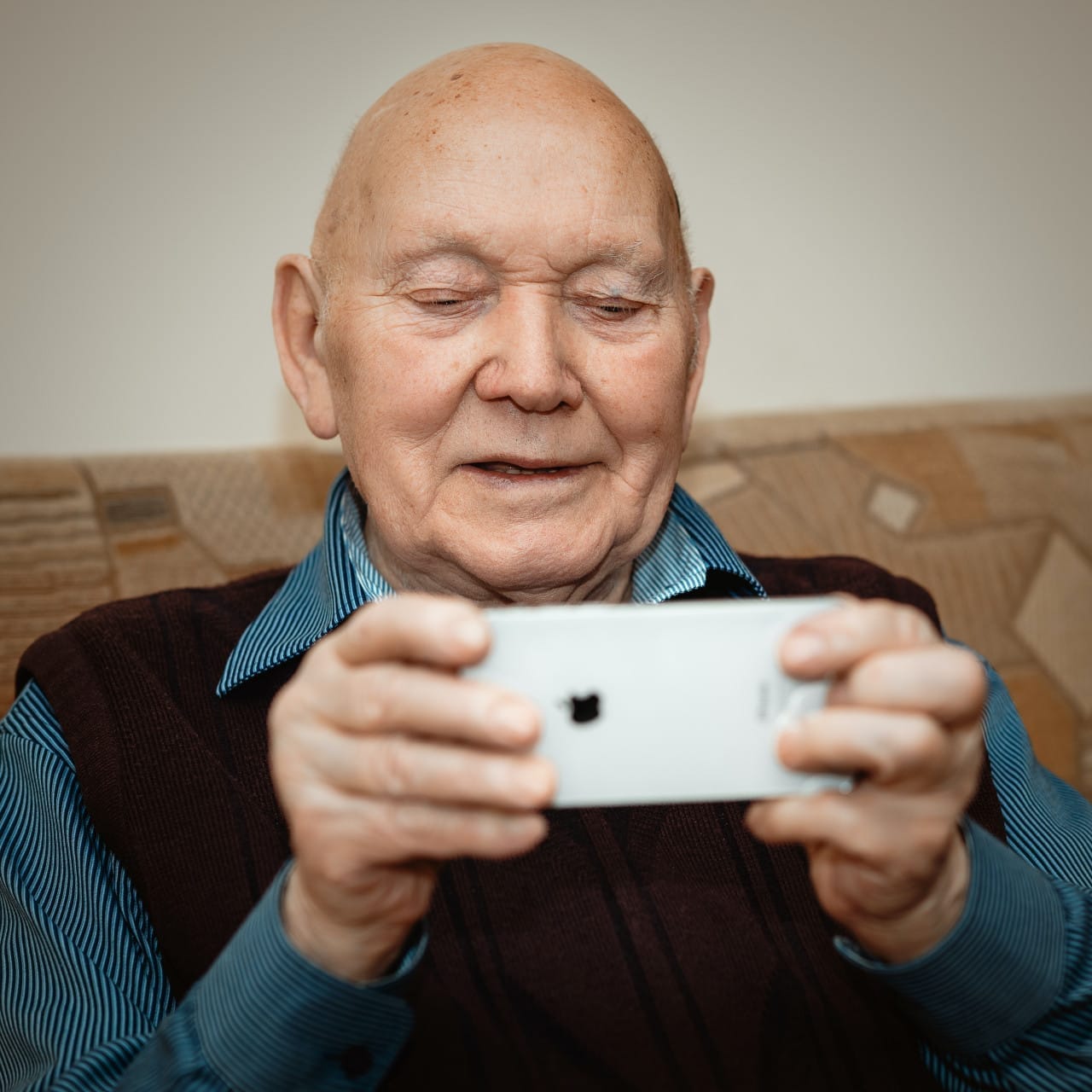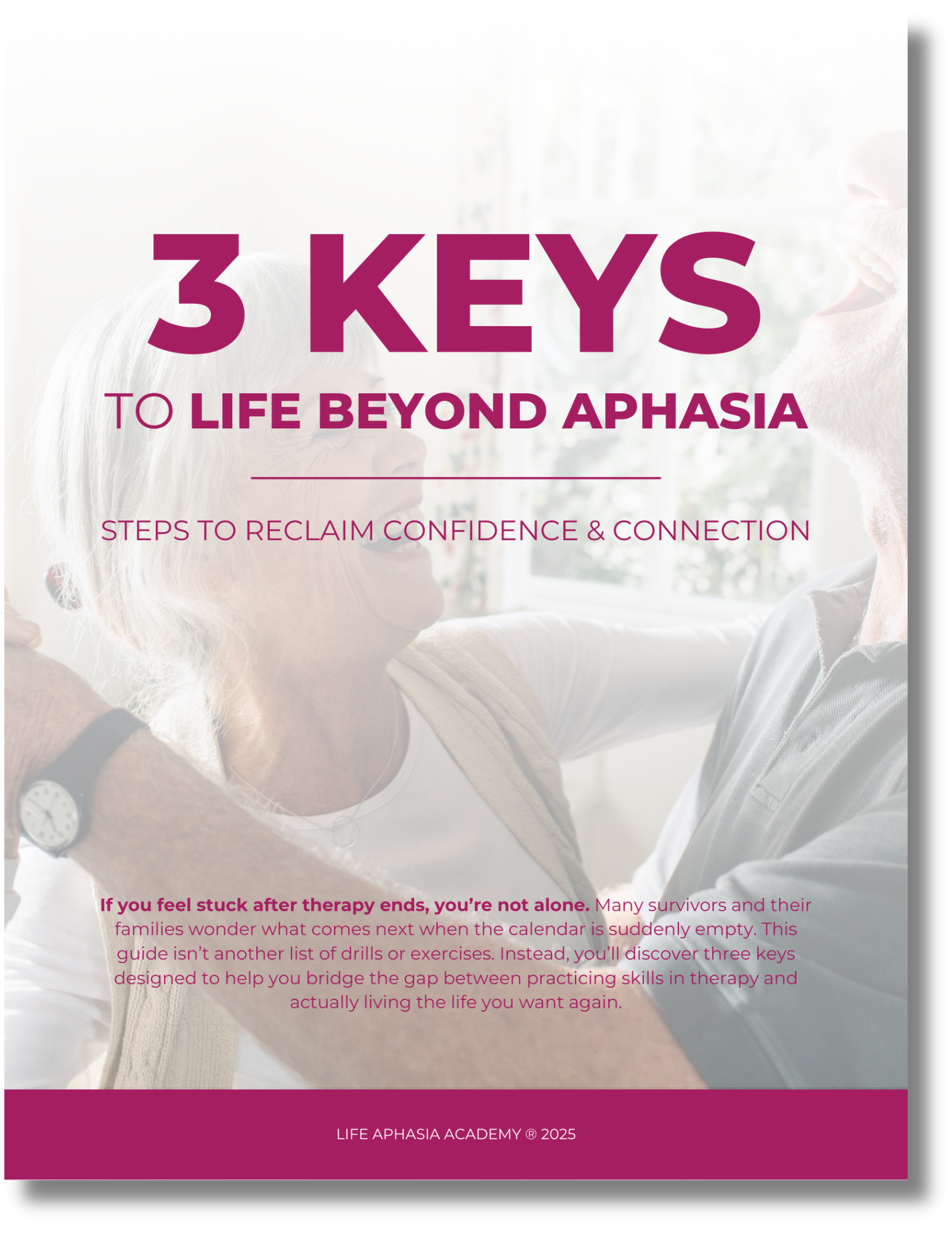LIFE Beyond Aphasia
Reclaim Your Voice, Your Purpose, Your Future
You built a life once. Now we help you rebuild communication, confidence, and connection so you can live it again.
Whole Person + Whole Family System
We help motivated adults and their families rebuild communication, roles, and relationships so life feels like theirs again — not something aphasia controls.
Aphasia changes more than speech. It affects confidence, identity, daily roles, and the way families relate to each other. Traditional therapy stops at words. We rebuild life.
Who is a Rebuilder?
Our system is designed for adults who want more than exercises.
They want their life, purpose, and independence back.
We work with individuals and families who fit these profiles:
The Professional
For leaders, decision-makers, or contributors who want to stay capable, connected, and involved at home and in the community.
Communicate with clarity and confidence
Take a more active role in daily decisions
Reconnect with your purpose and identity
The Active Retiree
For individuals who earned their freedom and aren’t willing to let aphasia shrink their world or isolate them.
Stay socially active and engaged
Maintain independence in daily decisions
Strengthen community and family connections
The Family Team
Because everyone’s life changed, not just speech. We teach both partners how to communicate, support, and connect without frustration, over-helping, or burnout.
Less conflict, more clarity
Support that feels helpful, not heavy
Communication that brings you closer
Rebuilding LIFE Happens at Home, Not Just in Therapy
Aphasia doesn’t live in a clinic. It shows up in conversations, decisions, and relationships.
That’s why our work focuses on rebuilding communication at home with the people you love.
When both partners learn new ways to communicate, everything changes. All they need is a system for rebuilding communication and connection at home.
Survivor Perspective
"Before, I avoided conversations at home and at work. I shut down because I couldn’t say what I wanted, and it pushed people away — especially my wife. When we started rebuilding together, things shifted. I stopped fighting this alone, and we found new ways to connect again. I finally felt like myself."
— CK, Survivor
Spouse Perspective
"I felt invisible. I didn’t know how to help without taking over, and every conversation turned into frustration. Once I learned what he needed and how to support him without stepping in, everything changed. We got our partnership back — not just our communication."
— JK, Spouse of CK
Rebuild Your LIFE Beyond Aphasia
Aphasia changed how you communicate, but it didn’t change who you are. We help you rebuild communication, confidence, and connection so you can return to the moments and people that make life yours again.
Step 1
Free Connection Call
Schedule a 15 minute call to share your story, ask questions, and see if The Rebuilder 90 Experience is the right next step for you.
Step 2
Map Your Strengths
Complete a two part evaluation that measures your communication skills and the nine areas that shape life after aphasia. You'll leave with a clear starting point and a plan tailored to your goals.
Step 3
See the Change
Once your plan is mapped, we rebuild your communication in real life so you can return to conversations, roles, and relationships that matter.
Now You Become...
A Rebuilder
Welcome to The Rebuilder Experience
The Structured Solution for Life Rebuilding After Rehab
You've made progress, but now you need a system to get your life back. This high-touch, 90-day experience is your essential launchpad.
We move beyond isolated therapy by addressing speech, language, and thinking alongside crucial factors like daily participation, confidence, and identity, ensuring the fastest path to professional and personal life re-entry.
Our two-part Strengths Mapping + Clinical Evaluation pinpoints your exact communication strengths and identifies every barrier holding you back. This clarity eliminates guesswork and ensures your goals are customized for immediate, real-world impact.
Many individuals finish traditional rehabilitation and wonder, "What's next? How do I get my life back?" Most therapy targets isolated skills, but true life rebuilding requires systematic progression.
Our coaching intentionally approaches recovery as rebuilding through three clinical phases:
Foundation (communication at home)
Connection (communication with people and places that matter)
Living (communicating with confidence in the world).
Because we complete the Strengths Mapping + Clinical Evaluation, we know your starting point and goals. We help you move systematically through these phases.
The 90-Day Rebuilder Experience is your essential launchpad into this systematic process; it is designed to achieve the progress needed to confidently start moving toward the next phase of your life.
We create a customized Life Participation Toolkit of proprietary communication supports (scripts, visuals, word banks) built specifically around your routines—not just exercises—so you succeed at home, work, and in your community.
We coach the person who supports you most to create synergistic rebuilding. When your care partner understands your journey and how to help you communicate, conversations stop breaking down, and support becomes helpful, not controlling.
We are not just giving you therapy; we are helping you systematically rebuild, as a team.
Weekly checkpoints and live office hour sessions keep you moving forward, ensuring you never stall, lose hope, or wonder exactly what is working.
When you have aphasia, speech therapy is only part of the equation. To fully rebuild your life, you need clarity on the process, your identity, and how to successfully navigate a complex world.
The Aphasia Rebuilder Course is our specialized answer to whole-life recovery. It gives you the knowledge to move beyond drills and understand the nuances of stroke.
This step-by-step training ensures your life expands beyond speech practice, because you learn exactly how to rebuild your life again.
It covers essential topics like
how the stroke impacts you and your loved ones
how to navigate change and grief,
initiate conversations and advocate for yourself
communicate in a variety of settings and situation
get back to living where aphasia is a characteristic not your whole identity
This step-by-step training ensures your life expands beyond speech practice, because you learn exactly how to rebuild your life again.
What changes:
You communicate more easily in everyday moments
Your care partner stops guessing how to help
Conversations become successful instead of stressful
You regain confidence, identity, and a meaningful role in daily life
You built a life once.
We help you rebuild the parts aphasia interrupted.
The Missing Piece: Moving Beyond Therapy
You finished traditional rehabilitation and expected to be further along than you are. You did everything right, but the system wasn't built to get your life back; it was built to give you therapy to make things somewhat better.
This is the gap. Families often do everything they can, yet communication breaks down, confidence slips away, and relationships get strained. Therapy alone isn't enough.
I spent years helping people speak again, but I saw this exact gap firsthand.
At LIFE Speech Pathology®, I built the programs I wish every family had from the start—programs that support both the person with aphasia and the partner who loves them.
When both people learn new ways to communicate, everything shifts. Conversations become easier. Roles make sense again. Life feels like life.
Online Telepractice Treatment
Therapy doesn’t need a clinic to change your life. With secure video sessions, we meet you where communication actually happens — at home, in your routines, and with the people who talk with you the most.
Get expert support without travel or disruption. You work directly with clinicians who understand that recovery isn’t about isolated drills. It’s about rebuilding confidence, connection, and participation in real conversations.
The advantage of telepractice: Your support team can join from anywhere. A spouse, adult child, friend, or coworker can learn alongside you, so everyone knows how to communicate, support, and connect without frustration or confusion. Progress doesn’t stay in the clinic — it shows up in your life.

Your home becomes the center of recovery, not something you work around.
Frequently Asked Questions
Medicare helps you practice individual skills, but it does not rebuild your life after aphasia.
Medicare therapy is designed for medically necessary basics and may include some care partner education.
Our Rebuilder 90 Day Experience goes further.
We look at everything that is needed beyond speech pathology treatment to rebuild your communication, your connections, and your roles in daily life.
Using our proprietary 9 step roadmap, we help you get back into life, find purpose, and create meaning again.
Speech therapy alone is not enough to rebuild confidence at home, at work, or in your community.
The Rebuilder Experience is where that work happens.
Insurance therapy helps you regain basic skills, but it doesn’t give you a plan for life after therapy — and that’s where most people get stuck.
Most survivors leave outpatient therapy knowing how to practice skills, but not how to use them in conversations at home, with friends, or at work. There is no roadmap for returning to your roles, rebuilding your identity, or reconnecting with the people who matter. That’s why so many people feel like they “should be better by now,” but nothing in daily life changes.
In the Rebuilder Program, we turn those skills into real-world success:
We identify the conversations and decisions that matter most in your actual life
We build the words, strategies, and habits you need for those moments
We practice with real examples — meetings, appointments, planning, social time
We include your care partner so you’re not rebuilding alone
A real example: CK completed two years of outpatient therapy but was still stuck at the lowest role in the department he once led. He could say words and do worksheets, but he couldn’t communicate in real situations. Through the Rebuilder Program, CK learned how to plan conversations, talk with his supervisor, manage team interactions, and give short presentations again. Within six months, he earned two promotions and returned to leadership — not because he practiced more speech, but because he rebuilt communication for the life he wanted.
You don’t need more exercises. You need a system that bridges the gap between therapy skills and real-life participation — at home, at work, and in your relationships.
Neurplasticity is the answer to why rebuilding never stops. Grab our free guide: 3 Key Reasons Aphasia Progress Never Stops
Yes! We help you understand how communication works in these situations and practice it in a step by step way.
Together we break down the conversations that matter to you, then build the skills and strategies that fit each one. Confidence does not come from repeating word lists. It comes from using your words successfully, with support, feedback, and adjustments, because real life is not linear. We will practice things like
joining or leading work conversations
speaking up in meetings or groups
reconnecting with friends and community activities
so you can walk into these moments with a plan instead of fear.
They are not a bystander. They are a Rebuilder too.
Your stroke impacted your spouse, partner, family, and friends. The strongest recovery happens when care partners are supported and have tools for their own roles and responsibilities. In our work we
teach partners how to communicate in a way that supports you without taking over
give them strategies to manage stress, expectations, and daily decisions
help both of you build new habits so home feels like a team again
We also offer a separate customized program for care partners through the LIFE Aphasia Collective®, so they have their own space to learn, process, and grow.
Learn more about the LIFE Aphasia Collective for Spouses and Care Partners
You will learn skills that help you get back to conversations with the people who matter, in the situations that matter.
We do not drill random words. We start with real moments from your life and build what you need for each one. That can include
talking with your spouse or family about daily plans or decisions
calling or texting friends and relatives
handling appointments, errands, groups, or hobbies that bring you joy
For each situation we build the vocabulary, concepts, and strategies that fit, then practice until they start to feel natural again.
You are “done” when you can participate in the moments that matter and do the things you want to do.
You set the goals. When you feel confident using strategies in the situations that are most important to you, you get to call your shots. Many people choose to continue with us, not because they are failing, but because recovery never truly stops.
There is always another skill, angle, or technique to refine. That is what neuroplasticity is all about. You can keep living and growing. It all starts with the Rebuilder Program.
We measure what changes in your real life, not just on a test.
Progress shows up in how you feel and how you function in everyday situations. Together we track
how conversations with your spouse or family are going
how often you join in instead of pulling back
how texting, phone calls, and social time with friends feel
how confident you are using your tools without coaching
If it is not changing life at home, we do not count it as progress.
This investment is about more than speech. It is about getting your life back.
Ask yourself what it is worth to live a life beyond aphasia, where aphasia becomes one part of who you are, like your hair color, and no longer defines you.
Our work together helps you
rebuild relationships and connection
return to roles that give you purpose
create a daily life that feels like yours again, even if it looks different than before
You cannot change the fact that you had a stroke, but you can choose what happens next.
The Rebuilder Experience is designed to help you build that next chapter on purpose.
Insurance and Medicare typically cover medically necessary speech therapy that focuses on restoring basic skills.
However, that clinical coverage does not extend to rebuilding identity, participation, confidence, or real-life roles—which is the focus of The Rebuilder Experience.
The Rebuilder Experience goes beyond what insurance pays for by giving you a guided system that transforms how you communicate and live.
Superbills are provided when appropriate for you to submit directly to your insurance provider for potential reimbursement for out-of-network services.
Ready to move forward?
Schedule your connection call today and let’s build a plan that fits your life and your family.
"I talk to my granddaughter!"
“Telepractice therapy has been a great opportunity for my dad to continue his speech therapy. He was unsatisfied with his speech when he was discharged from outpatient therapy 4 months ago. Genevieve is so compassionate. She has helped him focus on the quality of his speech, make eye contact, and think first before speaking.
He has progressed so much and can now talk on the phone to his granddaughter, who is away at college. We are so grateful to work with LIFE Speech Pathology.”
- OP, Daughter
Ready to see these kinds of changes in your family? Book a connection call today.

Discharged from Therapy?
Your Recovery Isn’t Over.
There’s the healing that happens with time. And then there’s the progress you create intentionally, step by step. Both matter. Both are possible.

Want to understand your specific type of aphasia?
Every person is different. Diagnosis alone doesn’t tell you how to rebuild your life, your goals, roles, strengths, and relationships do.
START REBUILDING HERE
RESOURCES & SUPPORT
TYPES OF APHASIA
Non-Fluent Aphasias
Fluent Aphasias
MORE THAN APHASIA
Recovery doesn’t stop. Communication. Connection. Life.
© 2026 LIFE Speech Pathology, All Rights Reserved






